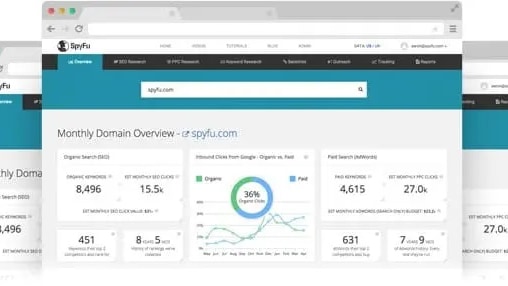Spyfu vs SEMRush: The best tool for online marketing
- 01SpyFu vs Semrush: overview
- 02What's the difference between SpyFu and Semrush?
- 03SpyFu pros and cons
- 04Semrush pros and cons
- 05SpyFu compared to Semrush
- 06Semrush compared to SpyFu
- 07Features comparison
- 08SpyFu vs Semrush: Which is the best for your business?
- 09Promotions on SEO software
- 10Alternatives to SpyFu & Semrush
Save up to $59 on Semrush
Save up to $59 on Semrush
Whether you're a budding entrepreneur or the head of a multinational corporation, understanding your competition's digital marketing strategies is pivotal for your online success. Fortunately, there's an array of tools tailored to unlock insights into competitive research, SEO performance, and paid advertising strategies.
In this article, we delve into two acclaimed digital marketing tools—SpyFu vs Semrush*. While both platforms empower users to uncover the secrets behind competitors' online success, they cater to slightly varied needs and offer distinct features. We'll dissect the pros, cons, and fundamental differences between SpyFu and Semrush to guide you in selecting the tool that's perfectly aligned with your business objectives.
*When you purchase through links on our website/article, we may earn an affiliate commission from Semrush
SpyFu vs Semrush: overview
SpyFu and Semrush are titans in the domain of digital marketing platforms, each boasting unique features and benefits tailored to diverse user necessities.
SpyFu is renowned for its unparalleled competitor analysis tools, allowing businesses to delve into their rivals' most profitable keywords, ad campaigns, and backlink strategies. It presents an exhaustive view of the competitive landscape, ensuring users remain a step ahead in their marketing campaigns. On the flip side, Semrush is celebrated for its comprehensive SEO toolkit and extensive database. With its intuitive dashboard, Semrush grants users the ability to optimize their website, track keyword rankings, and scrutinize backlink profiles with ease.
Now, let's navigate through the SpyFu vs. Semrush comparison, equipping you with the insights needed to determine the most fitting digital marketing tool for your unique objectives.
What's the difference between SpyFu and Semrush?


If you can afford it, SEMRush is definitely better than Spyfu. It has a lot of useful features that Spyfu doesn’t.
For example, SEMRush has a lot of social media analysis and tracking tools. It’s an integrated part of competitor research, and it’s really useful to anyone trying to build a presence on social media. Spyfu, unfortunately, doesn’t offer any social media insights.
SEMRush also has a lot of on-page SEO tools, like their site audit. This will help you identify areas of improvement for your site, and rank better on the SERP. Spyfu doesn't help with on-page optimization.
Besides the tools missing from Spyfu, SEMRush also has more in-depth analytics, and better reporting tools. If you’re an agency and you need detailed breakdowns for your clients, SEMRush is the better choice. But Spyfu also supports white labeling, so it’s not a bad pick either.
Just don’t expect too many integrations. Spyfu only integrates with about a handful of services, while SEMRush works with hundreds of third-party tools, including Zapier.
Lastly, Spyfu only collects data from the US, UK, and about a dozen other countries. If your target audience is anywhere else, you’ll be out of luck. Comparatively, SEMRush collects data from over 190 countries.
Overall, both SEMRush and Spyfu can be really useful for competitor analysis. They both have decent keyword research, and useful information for PPC campaigns. So if you’re bootstrapping and need to save money, Spyfu is a decent alternative. In all other cases, though, SEMRush is the better choice.
14 days free on the Pro plan + 17% off annual plans on Semrush
Get 14 days free on the Pro plan + 17% off annual plans on Semrush and up to $59 savings with Secret.
SpyFu pros and cons
What are the advantages of SpyFu?
- Competitive analysis: SpyFu excels in providing insights into competitors' keywords, helping users understand their rivals' SEO and PPC strategies.
- Historical data: Users can access a historical data archive of competitors' search marketing strategies, providing a long-term view of their activities.
- User-friendly interface: The platform is intuitive, making it easy for beginners and professionals alike to derive actionable insights.
- Affordable pricing: Compared to some other tools in the market, SpyFu offers competitive pricing, providing great value for its features.
- Backlink analysis: SpyFu's backlink tool lets users see which sites link to their competitors, aiding in building a solid backlink strategy.
What are the disadvantages of SpyFu?
- Limited by Google data: SpyFu primarily focuses on Google data, meaning insights from other search engines like Bing are missing.
- Not as comprehensive: While SpyFu is powerful, it may not offer the depth of data or breadth of features as some other advanced tools.
- Data refresh rates: The frequency of data updates might not be as regular as some users would like, affecting real-time decision-making.
- Regional limitations: SpyFu is predominantly focused on the U.S. market, which might be limiting for those targeting other regions.
- Depth of backlink data: While it provides backlink insights, the depth and breadth of backlink data might not be as extensive as dedicated backlink tools.
Semrush pros and cons
What are the advantages of Semrush?
- Comprehensive SEO toolkit: Semrush offers an extensive range of SEO tools, from keyword research and backlink analysis to site audits and position tracking.
- Competitive analysis: Users can dive deep into their competitors' strategies, understanding their organic search, paid ads, and content marketing approaches.
- Content marketing tools: With the content analyzer, topic research tool, and SEO writing assistant, Semrush aids in crafting SEO-friendly content.
- PPC analysis: Besides SEO, Semrush provides insights into paid search campaigns, helping users optimize their ad spends.
- Regular updates: Semrush frequently updates its database, ensuring users have access to the latest data for accurate decision-making.
What are the disadvantages of Semrush?
- Learning curve: Due to its extensive suite of tools, beginners might find Semrush overwhelming initially.
- Pricing: While Semrush offers a wealth of features, its pricing can be on the higher side for small businesses or individual marketers.
- Keyword metric discrepancies: Some users have reported differences in keyword metrics when compared to other platforms, which may lead to varied interpretations.
- Limited historical data: While Semrush provides historical data, it might not go as far back as some users require for certain types of analysis.
- Site audit limitations: Some users find the site audit feature to be less comprehensive or detailed compared to standalone audit tools.
Compare Semrush to other tools
SpyFu compared to Semrush
Spyfu and SEMrush are two prominent tools in the digital marketing sphere, each offering unique features for keyword research and competitive analysis. Spyfu excels in delivering detailed insights on competitors' historical keyword performance, allowing businesses to identify and capitalize on gaps in rivals' strategies.
On the other hand, SEMrush boasts a comprehensive suite that not only covers keyword analysis but also encompasses site auditing, backlink tracking, and content suggestions. While both platforms provide invaluable insights for SEO and PPC campaigns, the choice between them hinges on whether a user prioritizes a specialized deep dive into competitors' keyword histories or a broader toolkit for holistic digital marketing optimization.
Is SpyFu better than Semrush?
Determining whether Spyfu is better than SEMrush depends largely on specific user needs and objectives. Spyfu is renowned for its deep insights into competitors' keyword histories, allowing businesses to understand and exploit opportunities in rivals' strategies. SEMrush, meanwhile, offers a more comprehensive toolset, spanning keyword analysis, site auditing, backlink tracking, and content recommendations.
While Spyfu provides a more specialized focus, SEMrush is often seen as a one-stop-shop for broader digital marketing efforts. Ultimately, the decision between the two hinges on the scope of tools desired and the emphasis on competitive keyword analysis.
What is SpyFu best used for?
Spyfu is primarily lauded for its prowess in competitive intelligence and keyword research. By diving deep into competitors' keyword histories, it empowers businesses to unearth missed opportunities and refine their digital marketing strategies. Users can track and analyze rivals' search engine optimization (SEO) and pay-per-click (PPC) campaigns, gaining insights into which keywords are driving their success.
Additionally, Spyfu provides data on ad variations and organic search rankings over extended periods. This tool is best utilized by those wanting to enhance their online visibility by understanding competitors' strengths and vulnerabilities, thereby allowing them to craft more informed and targeted SEO and PPC strategies.
Can SpyFu replace Semrush?
Whether Spyfu can replace SEMrush depends on a user's specific needs. Spyfu excels in competitive intelligence, offering in-depth analysis of competitors' keyword histories and PPC campaigns. This provides invaluable insights into rival strategies and potential market gaps.
SEMrush, however, offers a broader digital marketing toolkit, encompassing site auditing, backlink analysis, and content optimization suggestions, in addition to its keyword research features. For those solely focused on understanding competitors' keyword strategies, Spyfu might suffice. But for a more holistic approach to digital marketing that requires a wider range of tools, SEMrush often stands as the more comprehensive choice.
Is SpyFu cheaper than Semrush?
Price considerations between Spyfu and SEMrush are influenced by several factors, including the selected subscription plans and the array of features each tool provides. At a basic level, Spyfu’s pricing often presents itself as a more wallet-friendly option, with its starting prices typically being more affordable than those of SEMrush's entry-level offerings.
But the landscape shifts as one scales up. SEMrush's extensive capabilities, especially in its advanced and premium plans, bring with them a steeper price point. These encompass a wider range of digital marketing tools and in-depth analytics, justifying the increased cost. It's essential for potential users to weigh the benefits against the costs, factoring in their specific needs and budgetary constraints, to determine which platform provides the best value for their investment.
Is there a better SEO software than SpyFu?
Whether there's a "better" software than Spyfu hinges on your specific digital marketing needs and objectives. Spyfu is renowned for its competitive intelligence capabilities and deep dives into keyword histories.
However, alternatives to Spyfu like SEMrush, Ahrefs, and Moz might resonate more with certain businesses. SEMrush provides a wide-ranging toolkit for digital marketing, Ahrefs emphasizes backlink analysis and SEO, while Moz offers user-friendly SEO tools and resources. The decision regarding the "better" software depends on your unique requirements, budget, and desired features.
Semrush compared to SpyFu
SEMrush and Spyfu are both formidable tools in the realm of digital marketing, yet they cater to different nuances. SEMrush provides a holistic approach to SEO and PPC campaigns, encompassing features like site auditing, backlink tracking, and content optimization. In contrast, Spyfu zeroes in on competitive analysis, offering users a detailed peek into competitors' keyword strategies and advertising histories.
While SEMrush is appreciated for its comprehensive suite of tools, Spyfu is often chosen for its specialized competitor insights. The choice between them rests largely on whether a user seeks an all-encompassing digital toolkit or a more targeted competitor analysis.
Is Semrush better than SpyFu?
Determining if SEMrush is "better" than Spyfu boils down to individual objectives in digital marketing. SEMrush boasts an extensive array of tools, catering to everything from SEO and PPC to content optimization and backlink analysis. It's recognized for its all-in-one digital marketing solutions.
Conversely, Spyfu stands out for its specialized focus on competitive intelligence, providing in-depth insights into competitors' keyword histories and PPC strategies. For those seeking a comprehensive toolset for a range of marketing tasks, SEMrush often comes to the fore. But for users who prioritize deep competitor keyword insights, Spyfu might hold the edge. The choice is inherently subjective.
What is Semrush best used for?
SEMrush shines as a comprehensive digital marketing tool, tailored for a range of tasks that span beyond just keyword research. Its strength lies in its ability to provide insights into SEO optimization, competitive analysis, backlink tracking, and content strategy, all under one platform. Additionally, its site audit feature helps businesses identify and rectify website issues, enhancing overall site performance.
SEMrush's extensive database and multifunctional approach make it an invaluable asset for marketers seeking an all-in-one solution to boost their online visibility, monitor competition, and fine-tune their content, ensuring it aligns seamlessly with prevailing search trends and user intent.
Can Semrush replace SpyFu?
Whether SEMrush can replace Spyfu is contingent upon a user's priorities in digital marketing. SEMrush is a multifaceted platform, encompassing a broad spectrum of tools from SEO optimization to content strategy and backlink analysis. Its vast suite allows for a holistic approach to digital marketing. Spyfu, on the other hand, is laser-focused on competitive intelligence, offering unparalleled insights into competitors' keyword usage and advertising histories.
For those who value a comprehensive toolkit that covers multiple facets of digital marketing, SEMrush might feel complete. However, for professionals primarily keen on deep competitive keyword insights, Spyfu holds its unique significance. The decision is inherently based on specific needs.
Is Semrush cheaper than SpyFu?
Analyzing the cost dynamics between SEMrush and Spyfu requires a nuanced understanding of the variety of plans and functionalities each platform provides. Initially, SEMrush's basic package tends to be priced higher than that of Spyfu. This might deter some cost-conscious users at first glance. Yet, delving deeper into the features, SEMrush encompasses an expansive suite of digital marketing tools, from SEO optimization to backlink analysis and content strategy, potentially offering a substantial return on investment for many.
On the flip side, Spyfu's pricing is often seen as more budget-friendly, especially for businesses or individuals starting their journey in digital marketing. Its emphasis on competitive intelligence and detailed keyword analysis offers users a focused approach to understanding market dynamics. Thus, while SEMrush offers a broader toolset, Spyfu provides specialized insights, and the perceived value-for-money will largely depend on the individual or business's specific marketing objectives and budget considerations.
Is there a better SEO software than Semrush?
Deciding whether there's a superior software to SEMrush hinges on your distinct digital marketing requirements and objectives. Different tools cater to diverse business needs in the realm of SEO, PPC, and competitive analysis.
Alternatives to SEMrush include Spyfu, Ahrefs, Moz, and Ubersuggest, with each offering its unique strengths. Ahrefs, for instance, is highly regarded for its backlink analysis. The choice of the optimal software largely rests on your individual circumstances, budget, and feature preferences. Thoroughly evaluating these factors is crucial in selecting the tool that best aligns with your digital marketing aspirations.
14 days free on the Pro plan + 17% off annual plans on Semrush
Get 14 days free on the Pro plan + 17% off annual plans on Semrush and up to $59 savings with Secret.
Features comparison
Spyfu Leads in User Accessibility While Semrush Offers Depth

In the digital marketing arena, choosing the right tool often comes down to user experience. When comparing the overall ease-of-use between Spyfu and Semrush, Spyfu seems to have a slight edge. Both tools undoubtedly present user-friendly interfaces and logical navigation pathways.
However, Spyfu's layout is particularly intuitive, with its design principles making it easier for even those new to the web marketing sphere. For instance, a beginner can swiftly locate keyword analysis options without getting overwhelmed. Semrush, though a powerhouse in its own right with an extensive range of features like site auditing and backlink tracking, might pose a steeper initial learning curve for some users. This is particularly evident when diving into its advanced analytics, which, while incredibly informative, can be dense for newcomers.
Semrush Outperforms Spyfu in Curated Content Strategy Tools

Content is the lifeblood of digital marketing, and tools that enhance content creation processes are invaluable. Semrush, in this context, takes a commendable leap by providing targeted content creation tools tailored to user needs. For instance, if a brand is venturing into 'vegan skincare', Semrush might suggest trending topics within that niche, such as "vegan skincare routines" or "benefits of vegan skincare". Moreover, it goes a step further by providing optimization tips, like keyword insertion and readability enhancements, ensuring the content resonates with the target audience.
Conversely, while Spyfu offers strong insights into SEO and competitor analysis, it lacks a dedicated feature for content ideation and optimization. This distinction cements Semrush's superiority in holistic content strategy development.
Spyfu Dominates in Detailed Competitor Keyword Insights Over Semrush

Navigating the intricate terrain of competitor keyword strategies can offer a brand significant leverage. In this arena, Spyfu distinctively stands out. It delves deeply into competitors' keyword arsenals, revealing not just which keywords they're bidding on in Google Ads but also their performance metrics, such as cost-per-click and search volume. Imagine identifying that a competitor is heavily investing in the term "sustainable travel gear" and leveraging that information for your campaigns.
While Semrush is undeniably a strong contender in the realm of competitive marketing strategy analysis, offering a myriad of tools from backlink analysis to traffic metrics, its probe into competitor keyword specifics doesn't match the granularity of Spyfu's insights.
Semrush Outshines Spyfu in Comprehensive Integration Options

The ability to integrate seamlessly with other platforms often dictates the efficacy of a digital marketing tool. In this domain, Semrush certainly takes the lead over Spyfu. Semrush flaunts robust integration capabilities, effortlessly syncing with high-traffic platforms like Google Analytics, Google Search Console, and even popular social media outlets such as Facebook and Twitter. This interconnectedness paves the way for deeper data insights, like tracking a user's journey from a social media post all the way to website conversion.
In contrast, while Spyfu does offer integration features, they lean heavily towards PPC and SEO-specific tools. For instance, you might integrate Spyfu with Google Ads but miss out on holistic insights spanning other digital touchpoints. Semrush's broader integration palette ensures a 360-degree view of your digital marketing landscape, encompassing everything from search engine optimization to active social media outreach.
Semrush Leads in Proactive SEO Guidance While Spyfu Focuses on Research

In the intricate landscape of SEO, actionable recommendations can be a game-changer for businesses. Semrush goes beyond traditional keyword analysis by offering users specific keyword recommendations, suggesting content enhancements, and even proposing backlink opportunities. For instance, if a business focuses on 'sustainable fashion', Semrush might highlight emerging long-tail keywords or suggest improved meta descriptions. This proactive approach empowers businesses to continually refine their web presence, securing a competitive advantage.
Conversely, Spyfu brings to the table strong SEO research capabilities, allowing for a deep dive into competitors' keyword strategies and paid ad campaigns. However, it stops short of offering hands-on guidance for content optimization, making it more of a research tool than an actionable SEO advisor.
Semrush Shines in Online Reputation Monitoring Over Spyfu's Feature Suite

In today's digitally-driven age, maintaining a pristine online reputation is paramount for brands. Semrush emerges as a beacon in this regard by equipping users with a proficient tool tailored for tracking online mentions of a brand. Whether it's a blog post, a tweet, or a news article mentioning "Brand X," Semrush swiftly flags it, allowing businesses to promptly engage or manage potential PR crises. This proactive tool ensures brands stay ahead of the narrative curve.
In contrast, Spyfu, although brimming with potent features like SEO analysis and competitor keyword insights, misses the mark by not offering a specialized instrument for real-time brand reputation monitoring. The distinction amplifies the importance of Semrush for holistic digital brand management.
Spyfu Masters Competitor Backlink Analysis Over Semrush's Opportunity Suggestions

In the quest to build authoritative and influential websites, understanding the backlink landscape is crucial. Spyfu excels in this domain, offering an in-depth backlink analysis tool that reveals the exact sources from which competitors secure their backlinks. For instance, if a competitor is consistently gaining links from a renowned industry blog, Spyfu will have it on your radar, guiding businesses in targeting similar high-value link sources.
On the other side of the spectrum, Semrush, while adept at presenting new potential backlink opportunities, perhaps from untapped industry forums or niche websites, doesn't dive deep into dissecting competitors' backlink portfolios with the same granularity as Spyfu. This contrast makes Spyfu a go-to for those intent on reverse-engineering competitor link-building tactics.
Subscribe to our newsletters.
No FOMO here. Stay up-to-date on all the latest deals and news with our monthly newsletter straight to your inbox like 112,000+ entrepreneurs (+ Get 10% off on on our Premium Membership!)
SpyFu vs Semrush: Which is the best for your business?
SpyFu is the best tool for you if:
- You need a comprehensive cloud solution; AWS offers computing power, storage options, and networking capabilities for large and small businesses.
- Scalability is vital; AWS's services auto-scale based on demand, ensuring optimal performance and cost-effectiveness for varying workloads.
- You value wide-ranging service offerings; AWS boasts over 200 fully featured services from data centers globally, catering to diverse needs.
- You prioritize security and compliance; AWS provides advanced security features with compliance certifications for sectors like finance, healthcare, and government.
- You want integrative tools and innovation; AWS's vast ecosystem and frequent service updates ensure that you're always on technology's cutting edge.
Semrush is the best tool for you if:
- Comprehensive digital marketing is your goal; Semrush offers SEO, PPC, content, social media, and competitive research tools in one platform.
- You want in-depth keyword analysis; Semrush provides keyword difficulty, search volume, CPC, and SERP feature data for strategic content creation.
- Backlink profiling is crucial; Semrush examines domain authority, backlink sources, and anchor text, enabling a robust link-building strategy.
- You seek a content optimizer; Semrush's writing assistant ensures content meets SEO standards, offering recommendations for improvement in real-time.
- You value market insights; Semrush's market explorer and traffic analytics offer a panoramic view of industry trends, audience behavior, and competitor benchmarks.
14 days free on the Pro plan + 17% off annual plans on Semrush
Get 14 days free on the Pro plan + 17% off annual plans on Semrush and up to $59 savings with Secret.
Alternatives to SpyFu & Semrush
Promotions on SEO software
Start saving on the best SaaS with Secret.
Secret has already helped tens of thousands of startups save millions on the best SaaS like SpyFu, Semrush & many more. Join Secret now to buy software the smart way.














